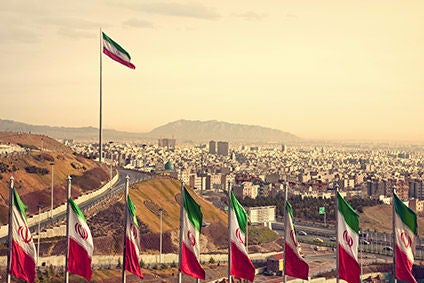
Analysts insist the recent deal ending sanctions against Iran “has to hold” as suppliers and OEMs – including those from Russia – eye the market as providing genuine opportunity.
Some are now describing the present opportunity as a “golden period,” with the automotive sector in particular, evaluating Iran, whose significant pollution issues could trigger significant demand for new technology.

Discover B2B Marketing That Performs
Combine business intelligence and editorial excellence to reach engaged professionals across 36 leading media platforms.
After decades of political isolation by a West suspicious of Iran’s intentions for its nuclear energy programme, the deal inked in Geneva has created a flood of interest in the country, with component associations and OEMS beating a path to Tehran’s door.
Some estimates put pent-up demand in Iran creating a 3m market as consumers look to replace a significantly ageing car parc, but access to finance and lingering hostility from some governments may still provide awkward barriers to overcome.
The draconian sanctions however, established by a nervous Brussels and Washington concerned Iran was enriching uranium for possible nuclear weapons, only applied in a limited sense to Russia, India and China.
That legacy was reflected in a dedicated Iran session for manufacturers at the recent Russian Automotive Forum (RAF) in Moscow, where Frost & Sullivan regional head, Automotive & Transportation, Middle East and North Africa, Subhash Joshi, outlined some of the opportunities in the country.
“It [sanctions deal] has to hold – there is no other chance,” Joshi told just-auto on the sidelines of the RAF and shortly after he attended the Iran Automotive Industry International Conference in Tehran. “The [Automotive] conference was planned for 15 November and they postponed it to 29 February in anticipation sanctions were lifted.
“It is a golden period – the quick winners will be staying in the market. Once sanctions were lifted, the consumer [was] waiting to see the result [of] what is happening in the market, so they are postponing [purchases].
“On the regulatory side, there is still no clarity, so I think it will take 2-6 months to see what will happen. If you don’t localise you pay pretty heavy duty.
“There are 1,200 key component suppliers – most of them are looking for some kind of partnership with a global company to develop their product to global standards. There are around 16 component categories for which they want partners.”
Of possible particular interest for some suppliers may be the Iranian government’s wish to reduce what appears to be heavy pollution, especially in the capital Tehran, which lies in a bowl prevalent to smog issues.
“Pollution is the big concern in Tehran,” added Joshi. “When I was there, I was around 15km from snow-clad mountains, I was not able to see them. The government is make [ing] sure only environmentally-friendly vehicles come to the market.
“When it comes to the commercial vehicle side, most of it is diesel. Anything which can help them control pollution is more than welcome.”
The lifting of sanctions has paved the way for European supplier associations such as FKG from Sweden and FIEV in France to evaluate the market, which they have been undertaking for quite some time leading significant delegations to Iran.
Equally, Bavaria’s Industry Association (VBW) says the recent liberalisation presents particular opportunity for the region’s automotive supplier sector, which has inked a deal with Iran’s Auto Parts Manufacturers body.
In November last year the VBW – Vereinigung der Bayerischen Wirtschaft – opened a liaison office in Tehran to provide Bavarian companies with advice on accessing the labour market and assisting with contacts to potential partners and political decision makers.
Of major interest also was PSA Peugeot Citroen’s announcement of a EUR400m (US$453m) joint venture with IKCO, complete with the proviso 40% of components must be sourced in Iran.
PSA and IKCO will set up as a 50:50 joint venture, which will see a Tehran facility established to produce vehicles and whose platform the Iranian company will share to develop its own models as well as the 208, 2008 and 301 Peugeot cars.






